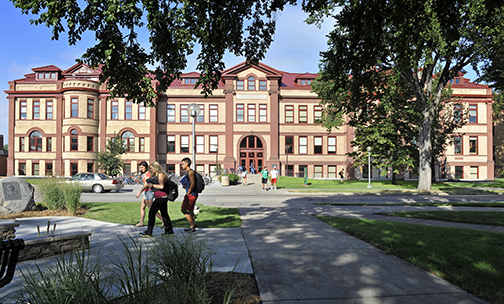
Philosophy/Humanities
This is an archived copy of the 2019-20 catalog. To access the most recent version of the catalog, please visit https://catalog.ndsu.edu.
North Dakota State University offers students a philosophy curriculum that may be approached either as a philosophy-humanities major or minor, or an interdisciplinary philosophy minor.
The Program
People have always had fundamental questions about the world in which they live. Among a wide variety of practical topics, they wondered about truth, knowledge, morality, goodness, or life’s meaning. By means of dialogue, logic, and critical and creative thought, philosophers have trailblazed pathways to wisdom and an understanding of the human condition, which not only helps our students live more fulfilled lives but makes them more competitive in their careers.
The Faculty
- Dennis Cooley
- Anthony Flood
- John Helgeland (Emeritus)
- Bradley Morris
- Adam Taylor
The Philosophy-Humanities Major
The philosophy-humanities major consists of 32 semester credits. Of these, the 21 credits are required. 11 elective credits, which can be independent studies, complete the major.
The Philosophy-Humanities Minor
The philosophy-humanities minor consists of 21 semester credits: 15 required and 6 elective credits from the elective philosophy courses, including independent studies.
Independent Study
Independent study along the lines of Oxford tutorials may be pursued by students wanting to read on a special philosophical topic (e.g., aesthetics) or read the work of a particular philosopher. To initiate independent study, students must contact a philosophy faculty member.
Interdisciplinary Minor
The interdisciplinary minor consists of 21 semester credits. Of these, 15 credits must be taken from the core philosophy courses and 6 credits selected from additional core, elective interdisciplinary or elective philosophy courses.
Please note this is a sample plan of study and not an official curriculum. Actual student schedules for each semester will vary depending on start year, education goals, applicable transfer credit, and course availability. Students are encouraged to work with their academic advisor on a regular basis to review degree progress and customize an individual plan of study.
| First Year | |||
|---|---|---|---|
| Fall | Credits | Spring | Credits |
| ENGL 110 | 4 | ENGL 120 | 3 |
| PHIL 101 | 3 | PHIL 210 or 215 | 3 |
| PHIL 257 | 3 | GE Quantitative Reasoning | 3 |
| GE Science and Technology | 3 | GE Science and Technology | 3 |
| GE Social and Behavioral Science | 3 | GE Social and Behavioral Science | 3 |
| 16 | 15 | ||
| Second Year | |||
| Fall | Credits | Spring | Credits |
| COMM 110 | 3 | PHIL 323 or 324 | 3 |
| PHIL 321 or 322 | 3 | GE Wellness | 2 |
| GE Humanities Req. | 3 | AHSS Social and Behavioral Science | 3 |
| GE Science and Technology w/ Lab | 4 | GE Fine Arts Req. | 3 |
| Minor/Free Elective | 3 | Free Electives | 6 |
| 16 | 17 | ||
| Third Year | |||
| Fall | Credits | Spring | Credits |
| PHIL 450 or 486 | 3 | PHIL 451 | 3 |
| AHSS Humanities Req. | 3 | AHSS Fine Arts Req. | 3 |
| Minor or Foreign Language | 3 | Minor or Foreign Language | 3 |
| Minor or Free Electives | 6 | Minor or Free Electives | 6 |
| 15 | 15 | ||
| Fourth Year | |||
| Fall | Credits | Spring | Credits |
| PHIL/HUM Electives | 6 | PHIL/HUM Electives | 5 |
| Minor or Foreign Language | 3 | Minor or Foreign Language | 3 |
| Minor or Free Electives | 6 | Minor or Free Electives | 6 |
| 15 | 14 | ||
| Total Credits: 123 | |||
